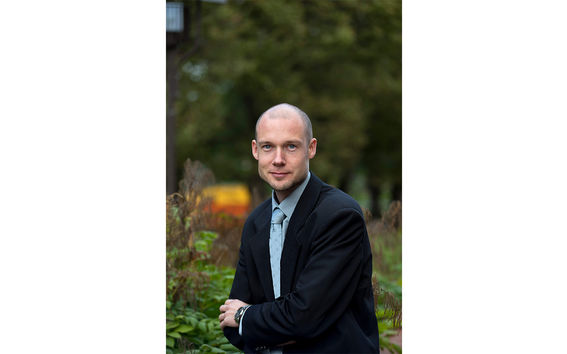Mauri Kostiainen has received a two million euro grant to study new biohybrid materials

The European Research Council (ERC) has awarded Aalto University Assistant Professor Mauri Kostiainen a prestigious ERC Consolidator grant for the Multicomponent Protein Cage Co-Crystals (ProCrystal) research project. The funding amounts to almost EUR 2 million and lasts for five years.
Together with his research group, Kostiainen seeks to utilize virus capsids, the protein shells of a virus, and other protein cages as building blocks for new biohybrid materials. Such materials aim to combine the highly specific functions of biomolecules with the versatility of synthetic materials.
Protein cages offer a tuneable, yet geometrically well-defined shell that can encapsulate different functional colloids and guide the crystallization of multiple different components. These crystals might function for example in catalysis and purification applications.
Possibility to direct nanoscale structural order in complex matter, is a prerequisite for the development of functional materials. Currently, most nanostructured materials consist of fully synthetic or biological materials, since it is challenging to integrate them in a designed manner.
“In our research, we propose an approach based on the electrostatic co-assembly of biological protein cages and synthetic materials to bridge the gap between these material types,” says Professor Mauri Kostiainen. “Protein-based nanocages, such as ferritins and virus capsids, offer a tuneable, yet geometrically well-defined cage that can encapsulate different materials and crystallize easily. Our target is to encode functions to these crystals and realize collectively behaving nanoparticle arrays.”
The ERC provides Consolidator Grant funding to researchers in the middle of their careers whose scientific career to date foresees particular success.
Bio
Professor Mauri Kostiainen obtained his M.Sc. in organic chemistry from the University of Helsinki, Finland (2005) and the subsequent Ph.D. in engineering physics from the Helsinki University of Technology, Finland (2008). After receiving his doctoral degree, Kostiainen spent 2.5 years as a postdoctoral fellow at the Institute for Molecules and Materials (Radboud University Nijmegen, the Netherlands) developing new approaches for chemical and physical virology. He returned to Aalto University in 2011 as an Academy of Finland postdoctoral fellow and joined the faculty of School of Chemical Technology in 2013. Currently, he is an Associate Professor in the School of Chemical Engineering at Aalto University. His research interests focus on the integration of biological and synthetic building blocks in a designed manner to create biohybrid materials.
Further information:
Mauri Kostiainen, Professor, School of Chemical Engineering, Aalto University
mauri.kostiainen@aalto.fi
Read more news

Significant donation to boost pavement engineering research and education
Companies and associations in the field have donated €400,000 to the School of Engineering.
‘Mesoscale’ swimmers could pave way for drug delivery robots inside the body
Researchers have discovered how tiny organisms break the laws of physics to swim faster — such secrets of mesoscale physics and fluid dynamics can offer entirely new pathways for engineering and medicine.
Design strengthens industrial competitiveness – human-centered factory work at the core
Factory work is undergoing a transformation: new technologies and artificial intelligence are changing the content and roles of work. Aalto University’s Department of Design is studying this change from a human-centered perspective in the HiFive project.






